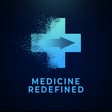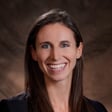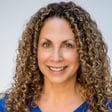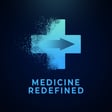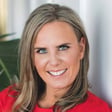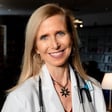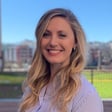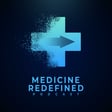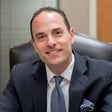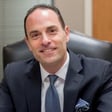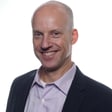Become a Creator today!Start creating today - Share your story with the world!
Start for free
00:00:00
00:00:01

156. MDW Special: Using Precision Medicine to Magnify Cardiometabolic Health (Rebroadcast) | Matt Martin
Matt Martin is the CEO of Precision Health Reports, a company focused on longitudinal analysis of cardiometabolic markers. Matt served as a U.S. Army Infantry Officer, gaining leadership skills in the fast-paced environment. His health journey took him down a path of precision medicine, in which he now works with healthcare practitioners, first responders, and individuals to ensure we can all do our part to improve cardiometabolic health.
Transcript
Introduction to Medicine Redefined Podcast
00:00:07
Speaker
Welcome to Medicine Redefined, a podcast focusing on helping you reclaim ownership of your health. I'm Dr. Darshah. And I'm Dr. Altima Sharaja. We're your hosts, here to challenge conventional practices and uncover the stories behind pioneers shaping the future of medicine. Our conversations not only focus on the individual level to dissect common practices for health optimization, but also zoom out to enhance systemic change. Join us as we look to break the status quo, move the needle forward, and put the help back in healthcare.
00:00:37
Speaker
All right.
Matt's Journey to Precision Medicine
00:00:39
Speaker
Matt, thank you so much for coming on to this show. Anytime Altamash and I have the chance to talk precision medicine and integrate that with cardiometabolic health, it makes us happy. It makes us curious, it makes us want to learn more, and that's your field and that's tops of the future as well. But I think it's important to have that discussion now, which is exactly what we're going to get into.
00:01:01
Speaker
But first, why don't we start with your background and your journey? You know, just to let the audience know, you're not a clinician, right? You're not a physician, but yet you are involved in this world of precision medicine. So let's talk about your journey and kind of how you came to it. Yeah, for sure. I appreciate you having me on. My background, honestly, I was an army officer for nine years. Definitely not healthcare related. I was an infantry officer, so
00:01:26
Speaker
The thing you think about when you think about someone in the army walking around in the woods with a rifle, that was what I did. Did that for nine years, ended up at a company called Trial Card. Trial Card is most famous for the copay cards and the discount cards that offset your copay at the pharmacy counter. And again, not an area I ever thought I would get involved in after the army, but
00:01:52
Speaker
you know, it gave me a taste of what it's like to help people access better healthcare and bring digital solutions into that field.
Personal Health Crises and Precision Medicine
00:02:02
Speaker
After about 11 years at trial card, really enjoyed it, learned a ton, but I always had this knack for, I wanna do something on my own, go build a company, grow it, all the pains and trials and tribulations that come with that. And,
00:02:20
Speaker
somewhat untimely but fortuitous at the same time. My mother-in-law had a heart attack and died suddenly in 2016 and we understood her to be rather healthy. She walked four miles the day before.
00:02:37
Speaker
but had a sudden heart attack and died. And that kind of stuck in my head of like, wait a minute, how did someone healthy pass away? At the same time, during those 11 years of that fast growing startup, you know, I had gained weight, kind of took my 30s off, I would say, you know, you start coming into work early, you start leaving late, you have lunches brought in.
00:02:57
Speaker
have a few beers on the way home, have a few on Saturday. Next thing you know, you're 40 years old and overweight. So I was one of those undiagnosed pre-diabetics out there floating around. So that combination of my mother-in-law's health issue, fatal health issue, and then my own health kind of being out of whack, it really led me to start taking control of mental health. So I started learning about diet, started learning about exercise.
00:03:27
Speaker
I actually used a ketogenic diet for about a year or two, really cut weight, got myself taken care of, and then got to the point where I met my co-founder with Precision Health Reports.
Understanding Precision Medicine in Cardiometabolic Health
00:03:42
Speaker
I'll give that longer story of that later on here. Yeah, sure thing. Thank you for that introduction. I think it definitely put some context as far as there's a personal story that gets you really involved when it comes to cardio metabolic health.
00:03:55
Speaker
I think it's a good point to kind of talk about what precision medicine is. It's something that I'm definitely interested in practicing in. And when other attendings or residents ask me, what do you plan on doing? Are you doing a fellowship? One of the things I say is I'm interested in doing precision and performance medicine. And then I get, what the heck is that? So how would you, in your words, describe what precision medicine means? Yeah, I think precision medicine really involves
00:04:21
Speaker
helping an individual identify where they are and meeting them where they are. Some people are not going to be ready for what you as a clinician are going to tell them, ready to make the changes necessary, whether it be dietary, lifestyle, or medical intervention. But it's identifying what's going on with them, really bringing the topic down to their
00:04:44
Speaker
their clinical history, their age, their gender, their ethnicity, other things that may be going on that are causing whatever health issues they have and really enable that conversation to drive someone into a position that allows them to make the best choices for their personal health goals and improve their health span.
Need for Personalized Medical Guidelines
00:05:08
Speaker
Yeah, I love that. And I think that, you know, for those listening saying, okay, well, what are we talking about? Are we talking about precision medicine? Are we talking about cardiometabolic health? And the answer is we can't do one without the other, right? We've talked at length before about how
00:05:23
Speaker
at least in the developed world, that cardiac-related diseases are the number one killer, chronic illnesses, and especially metabolic health as well. They go hand in hand. And particularly what you guys are doing, which we'll expand on a little bit further, is really assessing an individual's risk compared to themselves, an N of one, which is kind of how I look at precision medicine. I think it's so important to know the guidelines, to know what a population-based risk is,
00:05:53
Speaker
And that's the strength of the literature, the evidence that we look at that we often use to cite and formulate guidelines. But then the person in front of you, they have a very personal story. They have a unique story. They have limitations. They have expectations. They have goals. Kind of what you touched on is how do you meet them where they add, learn about everything that's unique to them,
00:06:17
Speaker
keep the population studies, the data that's come from the masses in the back of your mind, but only use them as kind of those, what do you call them when you go bowling, like those things at the end, or those like bumper lanes? What are they called? Yeah, I think so. That's right, yeah. Yeah. Anyways, use them as bumpers.
Challenges in Implementing Personalized Care
00:06:36
Speaker
There you go. See, I'm just so good. I don't know where you're going to have to use them.
00:06:40
Speaker
But use them as that and then, you know, you're trying to be very, very precise in the plan that you ultimately create. And, you know, I think about a typical marker for cardiovascular disease, right? We talk about ASCBD, right? And for those who don't...
00:06:56
Speaker
know or aren't familiar, like that's kind of your 10-year risk for major adverse cardiac events, right? And it really doesn't apply, I think, unless you're over what, age 60 or something like that, right?
00:07:11
Speaker
Is that correct me if I'm wrong? Yeah. We've seen the pooled cohort equation. There's a lifetime risk for younger people. There's a 10-year risk for people who are 60 or for, I believe it's 50 and older or 40 and older. And then between there, you get both 10-year and lifetime risk in the typical pooled cohort equation. Yeah. And we've talked about this at before. It's like for people such as myself, Darce, right?
00:07:37
Speaker
I think Darshan might be really close to 30. I'm in my 30s. That's not applicable. That's not really applicable. When we think about cardiovascular disease, it starts well before that timeframe, even your 30s. We have to be very, very proactive because whatever system that we have right now is not working.
00:08:00
Speaker
Maybe we should start with, because I think maybe some people, including myself, there are time that I'm listening and I'm like, well, you know what? It's really hard to do one patient at a time. The system's just not created for that. So I suppose the question for you, we always like to start with why, is
00:08:19
Speaker
In your opinion, and maybe even from your perspective as a patient, as you were kind of reformatting your life, is why do you think it's so tough to do one patient at a time? What kind of feedback do you hear from other clinicians that you talk to your partner?
00:08:34
Speaker
What's your experience with that? Yeah.
Optimizing Patient Care with Technology
00:08:36
Speaker
One patient at a time is hard because it takes time. Your average clinical visit in a primary care setting with the research we've got shows it's about 14 and a half minutes. That's not enough time to do it. One of the things that really excited me partnering up with my co-founder, Dr. Bill Cromwell, we were introduced right before COVID. Right about the time COVID was kicking off, a mentor introduced us together.
00:09:01
Speaker
and said, hey, I've got this lipidologist who has a solution to identify early risk for individuals to have type 2 diabetes, heart attacks, and strokes. So the first thing I did was jot down what is a lipidologist.
00:09:17
Speaker
and take my own notes there. But then once we talked, I realized what he was doing himself, and there was two other docs he was talking with, was he had a solution where he was going through collecting all the relevant patient individual clinical history, using a precise set of outcome-proven biomarkers, and then bringing those things together to talk with a patient about their personal risk.
00:09:46
Speaker
which is fantastic, that's a, you know, a lipidologist being a subspecialty of, you know, so it's pretty far down the road. Once you're talking to a lipidologist, you've seen a primary care doc, they've oftentimes punted you to either a cardiologist or an endocrinologist, and they've punted you down to this lipidologist. So it's very, very hard to get
00:10:08
Speaker
a personalized conversation in that typical 14, 15 minute primary care setting. So trying to do that one patient at a time is nearly impossible. I was fortunate to have never had a major health issue and had to get down to that level of care. But in your ordinary
00:10:31
Speaker
a clinical visit, just the time isn't there to do all that you need to do as a primary care physician to talk to that person about their personal risk factors and identify and have that shared decision making about here's your risk factors, let's figure out what you can and can't do, what you're willing to do to mitigate your risk going forward.
Business Aspects of Healthcare Efficiency
00:10:54
Speaker
So the obvious solution for that is to give people more time, but the problem with that comes is that's not a very good business model, right? I mean, and that's the issue, right? I think that people don't like to talk about it as much, but healthcare is, it's a large business, right? It is a business of medicine that we don't learn enough about and patients don't understand and actually really very few people, if any, understand truly how the business of medicine is conducted
00:11:25
Speaker
The other thing that some people might say, well, if we can't solve the time problem, maybe we need to figure out an efficiency problem. I think with the advent of AI, how much better that's getting. That's one of the reasons why I think a lot of things are protocolized. Because you just follow the protocol. You don't have to think good stuff. That has its own issues. We've talked about that. I think we've expressed our opinions on how that goes.
00:11:48
Speaker
kind of loses the art of medicine. But I'm wondering, if you've given thought to, if we can solve the time problem, can we make the problem solving aspect of it, particularly with respect to cardio metabolic health, can we make that more efficient? And if so,
00:12:05
Speaker
What are some tactics that come to your mind?
Using Precision Health Reports
00:12:07
Speaker
Yeah. Well, that's exactly where we started with precision health reports. As I learned from Dr. Cromwell, he was doing this in his clinic, even as a highly, highly seasoned lipidologist who understood all the details of the various complicated guidelines, it was still taking him
00:12:26
Speaker
20, 30 minutes per patient to aggregate this stuff to have the conversation necessary with that patient to talk with them. So what we have done together, and this was what I saw the same problem you saw. You can't add more time, so what can you do? You can take unnecessary time out of the equation and use it better. So what we did was took that process he was doing
00:12:53
Speaker
brought it into a system and allow computers to do what computers do well. They do the same process over and over again, very efficiently, very quickly. So right now, the preclinical work for a physician to use the product we have in our Precision Health Reports business, it takes 30 seconds for a physician to order. First name, last name, email address, send.
00:13:17
Speaker
the patient gives us the relevant clinical history. And we were very precise in only asking questions that were necessary. So it's nice to know, it's necessary to know are you on a statin or not.
00:13:30
Speaker
But it's nice to know which one are you on, what's the dose, are you taking it regularly or are you not. But that's not required by the guidelines to bring that information together. So were you prescribed a statin? Yes. Okay, great. We moved through the process. It's a few minutes for the patient to give us their relevant history. They have their biomarkers drawn by a flabotamist, lab core flabotamist.
00:13:54
Speaker
aggregate all that stuff together. And so it's into a common format of report. And so a physician who uses our tool is able to pick the report up and go right into a conversation. So that 14 and a half minute conversation that they have with their patient.
00:14:09
Speaker
They now have taken all the extra data aggregation collection, read the guidelines, figure out which ones are relevant in your case versus his case, and have that meaningful conversation so they can talk about interventions that they have. So the art of medicine, we stay out of. We help with the identification of what the risk is, but the art of medicine
00:14:31
Speaker
We stay hands off and leave that conversation between that patient and provider. It gets me thinking too, could one of the solutions be more clinic visits?
Health Check-ups and Proactive Management
00:14:40
Speaker
If you're going to be stuck with time at 15 minutes, do we want to now go towards two to three visits per year? Especially when you're looking at precision medicine, how often are you recommending patients look at their markers after a certain intervention?
00:14:57
Speaker
I mean, obviously it's going to be clinician-based, but what do you think? So we follow the guidelines. And what the guidelines typically recommend is no more frequently than three or four months. Someone who's very high risk for metabolic syndrome, very high risk for diabetes, or very high risk for cardiovascular disease.
00:15:19
Speaker
the recommendation is as a physician and for the individual to have that conversation and start doing potentially more aggressive steps, those people who are in that higher tier of risk, three to four months is a good time for the body to adjust, see if those interventions are working and they come back and test. If someone's moderate risk, maybe six months, someone who's in a pretty good condition, maybe once a month, once a year, sorry, check in to make sure that
00:15:50
Speaker
that you're still on the right track. As you said earlier, ASCVD is a disease that starts early and it's partially undetectable for a long time. But if you can detect it at the earliest points, you're able to make those interventions that slow the process drastically. So I think this is a good time to kind of talk about what the lab markers are included in precision health reports.
00:16:16
Speaker
But at the same time, is there a way that you can try to integrate it with maybe what cardiometabolic risk is and how we should be thinking about cardiometabolic risk? Because I think our listeners definitely understand the end results, the heart attacks, the strokes, death.
00:16:31
Speaker
And they probably understand the onset risk factors, cigarette smoking, the lifestyle factors that we always talk about on this podcast, poor sleep, poor diet, not moving enough. But what is that middle ground? Where does that onset take you, the lab markers we should be looking at before the problem becomes a problem?
Biomarkers and Cardiometabolic Insights
00:16:52
Speaker
Right, so I'll start with what the biomarkers we use are, and then merge that into how that really informs risk. So the biomarker set we use from LabCorp is we use their NMR technology. My co-founder was one of the clinicians who helped build the NMR lipo profile that LabCorp now uses. So he's got a bias toward LabCorp, and that's good. He understands their science.
00:17:21
Speaker
that their NMR technology is sound. So we use an advanced lipid panel. So that's your typical lipids, your LDL cholesterol, your HDL, your total cholesterol, your triglycerides, as well as ApoB. Some docs like to use LDL-P, and that's fine. We've got a solution for that. And then LPIR score comes along with that. So the lipoprotein insulin resistance score that measures how your lipoproteins are affecting insulin resistance better than
00:17:49
Speaker
fasting insulin and other ways to measure insulin. Lipoprotein A, so lipoprotein A being, I know in your podcast the past you've had lipoprotein discussions, which is fantastic. That's one of the things that most people don't know you need to measure at least once. And so lipoprotein A does get measured with us. Glyc A, which is a biomarker, a multi-marker for measuring systemic inflammation.
00:18:14
Speaker
HbA1c and fasting glucose. So all those things are brought together from the biomarker standpoint, but in each person,
00:18:25
Speaker
which levels of risk are inferred just by the numbers is irrelevant. Someone who has type two diabetes versus someone who has FH versus someone who has diabetes and FH, your targets for those biomarkers are gonna be different. And then you layer on top of that, someone who may have high APOB,
00:18:51
Speaker
but they don't, they haven't, you know, plaque hasn't started yet. So they don't have, you know, their CAC score is zero. Their CIMT has not shown plaque has started.
Technology's Role in Personalized Healthcare
00:18:59
Speaker
There's some dietary and lifestyle interventions that need, that could happen quickly and start cutting that process off. Someone who has ASCVD, you know, then you're talking about, you know, bringing your APO-B down more drastically. And so part of what we do with this is, you know, collect the biomarkers, show where you are from a snapshot of current risk and then apply those to,
00:19:20
Speaker
Your age, gender, ethnicity has plaqued started and really give that clean picture about how does this number translate to your risk, not this number on a grand population scale.
00:19:35
Speaker
I love that. So can you walk me through what it would look like on a first visit when somebody was to go to, let's just say their lipidologist, their primary care doctor, whoever is using this technology, specifically your technology, would they just send that person to LabCorp and put this on a script or place an order for precision health reports?
Empowering Patients in Healthcare Decisions
00:19:55
Speaker
Or do they end up reaching out to you and you have designated labs throughout the country? Like what does that look like?
00:20:01
Speaker
Yeah, so it's a great question. We have so we built this really to take that thing a lipidologist is doing again move it upstream To that primary care. I allow primary care doctors to deliver An advanced tool in a primary care setting rather than someone, you know having to get punted upstream several times So we made the process very simple a physician if you're you know
00:20:25
Speaker
If you're a physician and you're one of our clients, you would order this for a patient maybe a week or two before they're expected to come in. They pop into our system. We're working on EHR integration right now, so make it even easier in the workflow. Again, that first name, last name, email address, send. The patient receives an email that says, Dr. Darsh has ordered a cardio metabolic risk assessment for you.
00:20:53
Speaker
Click this link to create your account. We're going to ask you some questions. If you know ahead of time, if you've had a CAC score, if you know your current blood pressure, that speeds you through the process. And there's a series of questions. There's about 80 questions. Most people see 30 to 35. If you've never had imaging, we're not going to ask you what your imaging score was and how old you were. So it responds to the individual.
00:21:16
Speaker
They answer those questions, they receive a lab rec via email then to go to a lab core in the area for a fasted blood draw. So we wanted to make this easy to do where you are. Again, meeting the patient where they are, not requiring to come back to the doc. You can have dinner one night, go to bed, wake up the next morning, drop into a walk-in appointment at a lab core in your community on your way to work.
00:21:40
Speaker
have your blood drawn, go to work. And then we receive those labs in three-ish days, the long end, maybe if you're in greater, up in the Pacific Northwest, maybe five days. But all that blood gets sent to the NMR spectrometers in Burlington, North Carolina. We then receive those lab results in three-ish days, integrate all that together, and then that individual and the doctor both get an email that says,
00:22:08
Speaker
you know, match report is ready to use for this next clinical encounter. And we do that intentionally, you know, first we thought about why would we sit at the patient, not just the doctor. So it goes to both. And we think that's important too, because again, we want to enable the patient to participate in the shared decision-making process about them.
00:22:28
Speaker
We've all heard my doctor just gives me a pill. They don't listen to me. I don't know what's going on. So we wanted to really set it up where that patient has some background coming into the conversation about what's going on with my risk factors. The doctor has enough information ahead of time, having looked at the report before, understands the format, understands how to navigate. And that way, that short clinical primary care visit then
00:22:53
Speaker
can directly be, here's where you're at, let's talk about what we're doing. I love it. For the listeners, we had the opportunity to look at what a sample report looks like. As I mentioned offline to you, it's extremely comprehensive and it's digestible, which is what I love about it. Do the patients have an opportunity to see that before their initial visit, the data, or is that only until they meet the physician, then the physician can present that data to them?
00:23:24
Speaker
because technically the patient's data, so they should have access to it. Absolutely. And that was, again, for me as the patient side of our team, was let's make this available to patients. So the patient does get the report. As soon as we produce it, the patient gets access to the report, as does the doctor.
00:23:43
Speaker
Because you're right, it's their data, it's their report, it's their health, it's their life. Let's enable them to be part of the conversation from the get-go rather than showing up. Because again, in that short period of time, it would take a lot of time for that conversation to start with, hey, here's this report, here's what the report's laid out, here's what you're looking at.
00:24:04
Speaker
Whereas the patient comes in, already has some familiarity with what they're looking at, really helps guide that conversation to meaningful discussions about what are we going to do now? Yeah.
Empowerment through Self-Ordered Health Assessments
00:24:17
Speaker
And I'm sure at this point, some clinicians are thinking, well, that could be a real problem. Like for instance, what's different. And again, I have had the cheat sheet where I've had the opportunity to look at it. So I know this is.
00:24:28
Speaker
It actually explains it, like what those things actually mean, right? Like all the things that you talked about, like approaching little a, right? Apo B, what that means, what that means in the context of your family history, et cetera, et cetera, et cetera. So unlike a lot of the other places and a lot of the other systems where you just get some labs and you get a message, hey, your labs are up.
00:24:50
Speaker
There's no context for what that means. You might see some reference values that this is high, this is low. Hemoglobin A1C is high, but what does that mean? I don't know. And then what are they left to do? You got to get on Google. And Google can be a really scary place, I tell my patients. You have to really know where to look. And so that context, we've said over and over again, it wasn't set by us first, by somebody else. Context over contact is very, very important.
00:25:19
Speaker
That context is key. Something that we wanted to ask you a little bit later on, we think about the current and future of precision medicine and just cardiomycobiotic health and etc. Something I've spent a lot of time lately thinking about is how patients need to be greater advocates for themselves. When it comes to diseases such as cardiovascular disease, diabetes, all these chronic illnesses,
00:25:46
Speaker
where our system is, for lack of a better word, challenged to optimally provide care, right? No such thing or not really set up for preventative or long-term health. Patients have to kind of take matters into their own hands, so to speak, such as you did. And so is it always the case that you would need a provider to order this test for you? Or is this available to patients to get on their own just as they're more interested in learning about their health?
00:26:15
Speaker
Yeah, so we started with this being a tool only for clinicians. We wanted this to be only available at docs to prescribe, order it, and that's great. Until we fairly quickly realized there are people, I refer to this as what I call weirdos like me.
00:26:32
Speaker
who don't see a primary care physician regularly but still want to be healthy and understand what's going on with their risk for disease. We built an option on our website that individuals can come order for themselves, go through the same process, they get the results, will gladly send it to their primary care physician or their cardiologist or whoever they'd like to send it to, or they can take it
00:26:56
Speaker
understand it, use it, and then go from there. So we made it available to those people because what we didn't want to have is someone who wants to understand what's going on with their health be hamstrung because we have not contracted with their doctor yet. That's a system problem on our side.
00:27:16
Speaker
that would interfere with that individual being able to optimize their health. And so we very quickly enabled it where it's built for clinical shared decision making conversation, but it also works for an individual who's interested in learning about their health. As you said, they can download it.
00:27:35
Speaker
There's information about what is insulin resistance and why is LPIR a good biomarker
Clinician Education on Cardiometabolic Diseases
00:27:41
Speaker
for that. And there's links where they can go read more on content that my co-founder, again, highly seasoned lipidologist, really understands how these things interact with your body and keeps people from going to Dr. Google for advice. You know, Matt, it's honestly great to hear.
00:27:59
Speaker
Because I recently saw my PCP last year. And being a podcaster, having guests like you, Nicole Harkin, you know, other cardiologists, understanding LP, little A, Apo B, all these other things and trying to get those ordered was just a headache. You know, the first thing says that, well, there's no indication or I don't really know what that is. And it's tough, of course, for people in our field as physicians or clinicians, clinicians to
00:28:24
Speaker
admit that they might not know something. So then they kind of navigate, circumduct around that question saying, I don't really think you need at this time or something. So I love the idea that it could be a business to consumer idea with precision health reports. And I can finally just go and order that. And if everything's already there for what I need to learn, great. Because honestly, the more and more I look on social media, I'm finding consumers are sometimes more knowledgeable than clinicians when it comes to these things.
00:28:53
Speaker
because there's just so much information out there. So I guess my question to you too is, you know, when you're looking to bring on clinicians to support precision health reports and use that for their patients, is there a baseline knowledge that you're looking at in order for a clinician to kind of be on board or how is that education happening?
00:29:14
Speaker
Yeah, honestly, our goal is to get this into physicians hands. And if there's an opportunity to educate them, we're happy to do it. My part of the conversation is often here's how to order, here's generally how the workflow works. But my co-founder, he's an adjunct professor at Wake Forest University and likes to talk about this stuff. He's given jillions of speeches and lectures and talks about
00:29:44
Speaker
the various nuances and the nine and 10 and 12 syllable words that come along with practicing lipidology. He really grooves on educating physicians about the complexities of cardiometabolic disease. He got into this space because he was a scientist and said,
00:30:07
Speaker
what makes people unhealthy and what kills them? Cardiometabolic disease. Okay, that's what I wanna do. So that was his reason for getting into the space as a lipidologist. And so
Applications of Precision Health Reports
00:30:18
Speaker
he really enjoys educating a primary care physician because we believe that the more this, again, can be moved earlier in the care continuum, that that primary care physician who may not be as familiar with the complexities of lipid stuff,
00:30:35
Speaker
They're able to get their hands on this, understand what they're talking about, and have that conversation with their patient. We all win when the health system works efficiently like that, so we're glad to educate and help primary care physicians operate at the top of their license and maybe
00:30:55
Speaker
A lot of docs geek out on talking about things or learning about things they didn't know about before. We really get excited about the opportunity to educate on some of these complex topics. For sure. There are some third-party labs around me in a physical location where you can go and draw individual labs, but then it gets tricky because you have to look at it from an individual price point
00:31:18
Speaker
And then, of course, there are some reports already out there, more like in the functional medicine world and GI and Dutch tests and things. But then a lot of people get confused. Is it unnecessary? What exactly does it tell me? So a lot of things that you're talking about on Precision Health Report are data backed. There are things where science is actually doing the research. We all listen to the Peter Atia podcast. This is things that he kind of nerds out on and really has great episodes on. So these are things that we're looking at and that
00:31:46
Speaker
the medical system slowly catching up on. So to me, it makes it so much easier to think about that I can go and get this report and start actually making lifestyle changes for that. I guess my other question to you then is, are you guys only looking at outpatient practices or is there a role for this also within the inpatient side of medicine or within traditional hospital systems?
00:32:09
Speaker
We haven't approached any inpatient type scenarios yet. There probably is a place for it. Haven't really fleshed that out very far. It's possible, but we're really focused on getting this early in that disease cycle. Again, talking about my own health a little bit.
00:32:30
Speaker
I was 45 years old and I started kind of going down some of this pathway and my CAC score is zero, which yeah, clean bill of health, fantastic. Although I also did it because I had the opportunity, I did a CIMT of the carotid artery and there's early plaque there. So that clean bill of health after all wasn't as clean as expected because the CIMT was able to pick up soft plaque. And so that indicated that
00:32:55
Speaker
Here I am 45 years old, I've got vascular disease, need to start working on things more aggressively. So my first reaction was, well, I don't want to take a statin. I'll just handle it with diet and lifestyle. And then after about six months, I realized, I'm like, you're taking creatine in the mornings because you work out, you're taking this supplement here and there.
00:33:18
Speaker
why aren't you taking a statin and using that as a supplement to help your cardiovascular health and reducing that progression of vascular disease into potentially something worse? And so, I felt like I'm an example of regular person out there who needs to find disease earlier. So we're really focused on that primary care space
00:33:43
Speaker
We do have cardiologists that use our
Case Study: Identifying Familial Hypercholesterolemia
00:33:46
Speaker
product. We've got some endocrinologists and lipidologists, but we really find our sweet spot is in that where patients are. Matt, can I ask you, so you brought up a really good point about taking a stat in when at first you were probably against it.
00:33:58
Speaker
And I think there's so many of us, especially in the health realm that think of it, think of it that way that I'm going to do with the natural quote unquote natural way. And I'm not going to need something like a medication, um, to help me out, even though I may need it, even though my numbers really aren't moving. I've just, I refuse to do it. How did you think about that process? What was that conversation that you had with yourself, um, to get you being okay with trying out a statin?
00:34:25
Speaker
Sure, I spend a lot of time and again, I use the ketogenic diet to drop from 236 pounds to 190 pounds in a year. So it's ketogenic intermittent fasting. So of course you get into the ketogenic threads on Twitter and elsewhere, you start attending low carb conferences, you get kind of wrapped into that. And there's a lot of good information and there's a lot of other information in those circles that,
00:34:53
Speaker
You know make you take pause about you know, what is what is the effect of? some of these interventions and So, you know for me my first reaction was I'm not doing it. I read all these things about it you know, you have family members who take a statin and their their legs hurt or whatever and so, you know, I
00:35:16
Speaker
I've got a you know for me going to the gym is my like that's my sacred hour every day and my first thought was man I'm gonna take a statin and my legs are gonna hurt. I'm not gonna want to work out. I'm not doing it I'll just keep you know, it's just soft plaque. It's fine
00:35:32
Speaker
And for me, it became a function of, again, I'm taking other supplements for other things. In the wintertime, during COVID, we were all kind of supplementing with vitamin D because it's like, hey, we're not getting enough sun. Let's add some vitamin D to the stack. So it really just became a matter of, I'm doing all these things to stay healthy and maximize my health span. Why not take a low dose for Subastatin?
00:36:02
Speaker
and go with it. So I did spend a year and a half.
00:36:08
Speaker
I'm fine. My numbers have come down further into the acceptable range. Haven't gotten a CIMT yet again because this hasn't been several years and so there's really no reason to get it so quickly thereafter. But at the same time, my co-founder uses the phrase often, he'll tell you, think about 10 years from now, what a great day looks like. Just think about it in your head.
00:36:35
Speaker
And then think about it, if you've had a stroke between now and then, what that day is, what a great day is going to feel like, or you've had a heart attack in that window. And, you know, a stroke or a heart attack is a game changer. All those interventions that you're putting off, you're going to have to do anyway if one of those things happens. So why not do those things, feel good about it now and, you know, avoid the event that interferes with that quality of life that you expect to have 10 years from now.
00:37:04
Speaker
I mean, there's so much good stuff that you send there that's worth unpacking. I think, you know, so Darshan and I, we see a lot of people with musculoskeletal ailments, myself particularly, right? I'm in our sports medicine trained and so somebody's coming to me for pain usually, maybe from function issues, but primarily pain. And of course, most people, unless you have a rare genetic disorder, will experience pain at a young age. And we know when pain limits our function,
00:37:31
Speaker
what that disability means. And so we're very quick to address that issue, right? I've been having this conversation a lot with my patients where they're like, I want to get out of pain. And I ask them, well, why? Well, that's not really the goal. The goal is to be able to play golf, right? So if your knee doesn't hurt, you want to be able to play golf or play with the kids, et cetera. So what that awesome day would look like 10 years from now if you weren't in pain. But we can see that, right? We tend to be very short-sighted.
00:37:58
Speaker
And sometimes we knock on the younger generation folks in their 20s that they don't have the foresight what their life is going to look like, what their health is going to look like 20, 30 years from now. But I think the fact of the matter is people even in their 30s and 40s and 50s, they don't really have the foresight what 10 years from now, what disability looks like.
00:38:18
Speaker
It's because of knee osteoarthritis or something because they can kind of experience that on a day to day. I recently had a patient who again came to me for knee pain bilaterally and is not able to do the things that he wants to do, but hadn't seen a doctor. Now this is a firefighter and hadn't seen a doctor for 15 years. And I remember telling him, well, you need to see somebody because we have no idea what your kidneys are functioning like. We have no idea what your heart health is like. And all those things that I'm talking about getting addressed
00:38:49
Speaker
when they present with symptoms, it could be it, right? Like it presents a heart attack as a stroke or something like that. Your pain that you're presenting to me, that's not gonna kill you. Shortest effect on your function causing some disability, but all those other things are a real problem. And so I just find myself having this conversation over and over and over again. I don't know what's special about the people who do have that foresight of what 20, 30 years now looks like. And I mean, even in your case, right?
00:39:17
Speaker
You mentioned it was a close family member who passed and that was kind of a wake-up call, right?
Proactive Health Management
00:39:23
Speaker
And so it's a really tough problem to encounter as a clinician, as somebody who's passionate about
00:39:33
Speaker
their own personal longevity, but also the health of their patients. I don't really know what the solution is, but I do love that where Darsh talked about it in terms of how you guys have this comprehensive bundle. I suppose the question or the thing worth addressing for some people would be is, nowadays, people listen to podcasts and they hail all kinds of different platforms, places they can get their labs drawn. I'm looking at something else right now, I won't mention the name,
00:40:02
Speaker
but where they can get a comprehensive paddle and I'm kind of just looking at their prices. I suppose somebody would want to know, well, what's special about Precision Health Reports and why should they opt to go with that? Put your sales hat on and give me an answer. Yeah, for sure. We're very specific in the biomarkers we use. One of the things that my co-founder, it really believes in one of his core tenets is,
00:40:26
Speaker
use the fewest amount of biomarkers that are the most informative to get to the answer. If I draw three different ways to measure your insulin resistance,
00:40:36
Speaker
Which one do you trust? What trust in his LPIR? Okay, well, why draw the other two then? It's just gonna give you a wrong answer. So we were very direct in making sure that our assessment had the fewest number of biomarkers that were the most predictive and the most proven set that would not cause confusion. And then with that, taking, again, just those lab numbers and bringing them together to make them about you,
00:41:02
Speaker
So the three of us are going to have different targets for our APO-B number. We'll have the same target for LPIR if you want to get your insulin resistance as insulin sensitive as possible. But through us, we make it an affordable price and so we don't have some sort of outrageous, go cobble a bunch of labs together to get
00:41:23
Speaker
to get a report, but we get that fewest number of most predictive labs that give you a picture of what's going on with you and your health and allow you to make very clear decisions and those numbers we give you, they're not numbers we've made up.
Actionable Health Data
00:41:38
Speaker
We don't try to have some sort of
00:41:40
Speaker
Here's your heart health age or here's your diabetes in context of everyone else in the country. It's really about you. You don't care about average numbers and you don't need us making up a heart health age. We give you, here's your risk for where you are. Here's where your target should be.
00:42:03
Speaker
for your lipoprotein management score, here's where your metabolic syndrome should be, here's where insulin resistance should be. Measure yourself to things about you and then whether directly as an individual or through your clinician, work to hitting those targets that are specific to your health. And so if individuals were to approach this themselves and take matters into their own hands,
00:42:31
Speaker
how often, I know you're not a physician and we're not giving any medical advice, nor are we giving any recommendations here, so just to make that clear, but how often could one, I mean, I suppose they could get it as many times, but let's just say, do you do it yourself, and often do you check your own stuff if you're making some tweaks every six months, every four months, as you said before, or what? Yeah, so I put myself on a six month schedule. For me, it was, you know, my numbers were in a pretty good place. I've got a little bit of plaque.
00:42:59
Speaker
Check in on it, okay, by taking a low-dose rhesivostatin, continuing a lower carb, higher protein diet has worked for me. I exercise pretty intensely every day. So my numbers have gotten to an acceptable range. My risk scores are okay. Because I already have plaque, I'm always going to be high risk for cardiovascular disease just because
00:43:20
Speaker
Once the process has started, that keeps me at a high risk, but I'm a managed high risk.
Monitoring Health Markers Frequency
00:43:25
Speaker
And so I just want to check back in every six months, make sure that my, in my case, I measure LDL-P just because that's where I started. So I just want to keep that continuum going of that, but that's common biomarker. But as long as I'm on track, that's a good enough number for me. So I'm happy with where I am. So six months is a good window.
00:43:48
Speaker
So obviously we know plaque can start even the teenage years, maybe in a little bit earlier at that point. Is there a specific age that you recommend getting started with precision health reports? Is it optimized specifically for an age group?
00:44:04
Speaker
So we go off with the guidelines, say. And the guidelines don't have any sort of risk categories for people below the age of 18. The recommendations for imaging, CIMT typically is no younger than 29.
Guidelines for Precision Health Assessments
00:44:19
Speaker
A CAC score, typically mid 40s, is about the earliest that you can get a CAC score that makes any difference. And so those people in that, as early as possible, you start kind of thinking about things. When you're in your 20s,
00:44:33
Speaker
ASCVD is somebody else's problem. That's your, that's your mom and dad's problem. That's not my problem. You know, maybe in your thirties, you're starting to think about it a little bit. Um, but you know, once you start, you know, thinking about health, it's like, you know, mid thirties is a good time to check in. Um, make sure, make sure you're on track, start getting aware of what biomarkers and what things affect you as you get into those thirties and forties. When, when things start to hurt and you don't know why, um,
00:45:01
Speaker
Being ahead of the ball is kind of a good window. The way that ASCVD risk measurement happens, as I said earlier, younger people only get a lifetime risk because there's not enough data to show what your tender risk is when you're 30. Then you get that middle range where you both get a lifetime risk and a
00:45:22
Speaker
and a 10-year risk, and the older people, once you get a 60-year-old, you only get a 10-year risk. And effectively, what you're doing is moving that 10-year risk further and further down the line. So when you're 90 years old, and you end up with a 3% risk of having an event in the next 10 years,
00:45:43
Speaker
You've won, you know, you've, you've extended your health span and punted that risk further and further down the, down the timeline. And I guess people can take the data too, and use the Snyderman 30 at risk and calculate that online to see, you know, whether you're 34 years old, kind of down the line, how they're looking. Awesome. Ultimately, should you have any other questions for, uh, about prison health health reports? I was interested in, uh, Matt's kind of current regimen too, in terms of how he got his markers down and stuff.
Matt's Health Routine: Diet and Exercise
00:46:09
Speaker
Oh my God.
00:46:12
Speaker
No, I was going to ask him. I want to know about, I know you mentioned low carb diet, but I'm more curious of like what you mentioned, ketogenic humanitin fasting. Give me a day in the life of what your diet's like now. Yeah. So where I am now, I use keto to get.
00:46:27
Speaker
the weight off. It was a fantastic tool for that. I liked it, but I could see it was pushing my lipoprotein values a little higher than I liked. And so I shifted to more of a low carb. So when I was the keto, it was 20 grams of carbs a day or less. I mean, and to the point where
00:46:44
Speaker
Hmm. I'm going to take this pickle off this off of this bundtless burger because I'm going to pick up, you know, that saves me two carbs. And so I was I was that regimented to the point my parents thought I was really lost my mind, you know, choosing buster over mayonnaise and weird things you would choose just to stay under that 20 grams of carbohydrates a day.
00:47:05
Speaker
doing the typical, you know, doing the breath thing to check your ketone levels. Once I had a target weight, I really shifted back into for, you know, probably six days a week, I was in a 16-8 intermittent fasting schedule, you know, shifted my carb level up into the, you know, 60s, maybe 70 grams a day, really trying to optimize for protein.
00:47:31
Speaker
You know, I believe that, and you guys have said it before, you know, we're an under-protein population. And Peter Tia has mentioned several times, you know, protein is not a percentage target, it is a numbers target. And so for me, I try to shoot for about 160 grams a day. Most days I end up...
00:47:48
Speaker
120, 150. I don't track it actively, but having tracked it pretty religiously for about two years early on, you understand what foods hit your goals. And some days you're just full. There's no reason to eat when you're full just to hit a number. And so nowadays, a little heavier in the gym as far as my lifting regimen, trying to hit some targets I want to hit. My goal for the year is a thousand pounds between
00:48:17
Speaker
within an hour of one rep bench press, one rep squat, one rep deadlift. So I'm about 60 pounds short still. But within this year, I want to get there. And so what I'll often do, and I get home from the gym, particularly on a heavy day, is I'll get some protein in on board pretty quick. I don't know if protein timing really, really matters, but
00:48:42
Speaker
There's no reason not to if you're a little hungry and you wanna feed the muscles, give them what they need. So really my targets are 160 grams of protein, less than 75 grams of carbs is really a cap for me. And then making sure I get that hour plus in the gym, not because everyone needs an hour at the gym. I just like it. I like the way I feel doing it. I have to kind of balance myself a little bit. Being 46 years old,
00:49:11
Speaker
you know, have to worry a little bit about over-training. And I'm prone to do that just because I enjoy it so much.
Maintaining Health with Diet, Exercise, and Medication
00:49:18
Speaker
So it's kind of how I stay where I'm at. And I've got my LDLP numbers down. I think at last I checked, I was like seven something, 750 or so. So, you know, I'm down well in the range where I want to be. And, you know, as knock on wood, as far as I know, the plaque progression process has drastically slowed or stopped.
00:49:42
Speaker
Love it. Awesome. Well, Matt, this has been really awesome. I mean, I love this. Like I said, I'm more excited to kind of learn more about it and maybe even kind of use it to see what it looks like, what my numbers look like. I agree with you, Darsh. I think that I've been interested. I think I've told people before in another life, if I had to go down the medicine pathway, I think cardio would be the path for me.
00:50:10
Speaker
I don't know if six years of training sounds appealing at all, but it is certainly interesting. It's worthwhile. It's information that I think is, it's important for every single person to know, write some of the tests that we mentioned everybody should have done. I'm interested, you said that the guidelines 18 years of age, right below that
00:50:28
Speaker
We can't really just recertify. I remember Dr. Harkin, Nicole Harkin, shout out to her. She mentioned that even I think once for enduring pediatrics, like a pediatrician should be ordering a total cholesterol panel. So I'm wondering if, and do you have any clients who are pediatricians who are using this? Is that available? Do you know? We do not.
00:50:50
Speaker
I want to say it's the ACC or the ESC guidelines, the American College of Cardiology or the European Society of Cardiology. Their guidelines kind of stop at 18 for their typical guidelines. So we try to stay very guideline focused so we don't go deeper. Now, I will tell you with someone with FH, familial hypercholesterolemia,
Early Disease Detection and Prevention
00:51:16
Speaker
You know that's a place where if a person has it obviously checking their their children as soon as possible and starting to you know think about that makes a lot of sense you know some of the the
00:51:28
Speaker
the genetic conditions that affect cardiovascular risk, that's a good place to start earlier. But again, only from what I read, not having any sort of clinical experience there, and we don't have any pediatric physicians using our product at present. Awesome. Well, I'd love to know what's kind of next on the agenda. As we spoke about, I mean, you guys, so 2020 was the inception of the company, right? Correct.
00:51:58
Speaker
So, I mean, this has really developed into something very, very cool, but I'm sure you guys, you talked about trying to get it and make it more accessible to more clinicians, but anything else, I mean, have you guys thought about expanding it, like in terms of allowing more biomarkers or, I mean, I'm sure those kinds of conversations are being had. What can you share with us that people could be excited about with precision health reports and really anything precision medicine, cardiometabolic health in your opinion?
Expanding Precision Health Reports
00:52:28
Speaker
Yeah, so yeah, we're always talking about what's next. And we always believe, again, I had some great mentors in a previous business, a trial card, would always listen to what your customers tell you. They'll tell you what they want, what they want, what helps them do their jobs better. So it doesn't really matter what we wanna do, it's what your customers want. And so with us, an area we're getting a lot of focus, we're spending a lot of time in and have got a lot of traction is working with
00:52:57
Speaker
police departments. Law enforcement officers, first responders have drastically outsized risk for cardiometabolic diseases, particularly cops. Your cops, 50% of police officers will have a heart attack or stroke within five years of retirement or sooner.
00:53:21
Speaker
Why? Because their diet's not very good, because they're always eating at different times, their sleep schedule's off, their stress moves around. Some cops will tell you, some won't. They spend a lot of time in the patrol car, in the seat.
00:53:38
Speaker
sedentary-ish position. So they're at much higher risk. And so we've partnered with some police departments directly and with a company called Performance Protocol that partners with Axon, the company that makes body cams and tasers.
00:53:57
Speaker
They're their coaching division and they've implemented our assessment as part of their police performance program. And so we're spending a good amount of time finding ways to support them and helping officers in police departments and municipalities find disease earlier cut down on their health care spend.
00:54:18
Speaker
and have healthier officers. You know, healthier officers are better officers at what they do. And we all need, you know, when we need our police force, we need them, we need them optimally trained and optimally performing. So that's a big focus area for us.
00:54:35
Speaker
With clinical stuff, we've been very concise in our biomarker set. We have had some physicians pop back up and say, I love the tight group and I understand why. Is there any way I could get an extra biomarker here or there? And so we're right in the middle of that right now with a couple of different customers. We're testing the process. It's really just a process thing on our side. We can add additional biomarkers as we go.
00:55:03
Speaker
for them. So we're glad to do it. And again, part of what we want to be is an enabler of clinical decisions. I believe that my co-founder is a fantastic doctor. My role in this whole thing we do is to enable better doctoring with technology without getting in the way.
00:55:27
Speaker
And so I go to health conferences and you end up at some of these larger health conferences and they're very focused on interoperability and data sharing and data structures and stuff.
00:55:41
Speaker
you know, that kind of happens in the background, but that shouldn't be our primary focus. Our primary focus is being an enabler to help doctors do the practice of medicine and get there. So we're continuing to listen, continuing to learn whether it's current clinicians we work with, whether it's other docs who we don't work with yet who might be used to, might be interested, or it's just docs in general. I mean, we create feedback on, you know, how can this help me
00:56:10
Speaker
help my patients optimize their health span. I've experienced it personally. Some of my own family members have used our assessments. My wife, through our assessment, she identified that she has familial hypercholesterolemia. So she's an FH person, 45 years old and didn't know it until she went through our process.
00:56:30
Speaker
Started talking with her doctor about what they were finding. You know did the dutch lipid Uh test to figure out i've got fh. Okay. Well good. We'll manage you differently now Fantastic and she's having great success with with that my my father. Um 71 years old average guy Used our assessment found out that he needed to take care of some things and so, you know seeing seeing the impact it's having on people I know personally and the feedback we're getting from doctors, uh keeps us motivated to keep listening for
00:57:00
Speaker
what do we need to do, whether it's more biomarkers, whether it's another kind of diagnostic test. I mean, cardiovascular disease and cardiometabolic disease are a pretty large problem. So we don't necessarily have to move into other disease states, but if there's a need for us to get there, we're open to making it happen. And again, empowering that clinical process and giving you and your patients
00:57:27
Speaker
better use of the time that you've gotten together. Love that, man. I mean, a lot of exciting things on the horizon. We listened to your episode, I believe it was called the Co-Optimizer podcast. So we can, yeah, about the police department and, you know, those stats, I feel like I knew, but I never really realized it until I listened to that episode. So staggering stats. We'll definitely link that podcast in our show notes as well.
00:57:49
Speaker
You know, anytime Ultimash and I have the opportunity to talk to a non-clinician, right? I mean, you talked about your role, how important that is. Oftentimes you come in with a different vantage point than us clinicians do, right? I mean, a lot of times we're siloed and we kind of get blinded by what we see in the hospitals and the clinics. So I do want to ask, what is something, you know, when we talk about the future of precision medicine or maybe the current state, what is something that most people are not thinking about when it comes to precision medicine?
00:58:16
Speaker
about what it can do or maybe where it might go. Yeah, I would say this might be sort of an answer, might not be. But I think a lot of it has to do with helping a person hit the goals they have. And as an individual, sometimes you have to step back from all the things going on in your life and identify what you want your health to be. And there's more and more precision medicine tools now to help you get there.
00:58:40
Speaker
Honestly, I think precision medicine really becomes a better way for individuals to partner with their care teams and clinicians to get where they want to be health-wise.
00:58:56
Speaker
It's probably as succinctly as I can get it, but it's really about enabling people to maximize the health span and hit the goals they wanna hit and understanding what's going on. The better we as individual people understand health and particularly our own health, the better quality of life we're gonna have and start turning around those numbers. It'd be fantastic for cardiovascular disease not to be the number one cause of death in our country, but we're far from that, but gotta start somewhere.
00:59:25
Speaker
That's our summary, man. You guys are making it easier for people to start. Matt, thank you for the good work. Thanks for coming on. I truly enjoyed this discussion and learning about your company and more about what it is that you guys are doing.
00:59:39
Speaker
You know, last but not least, certainly you were expecting this question that's coming at you is, you know, the kind of things that we get excited about is adding the health back to healthcare, right? It's not currently how we practice. It's how we want to practice. And a lot of people share that passion with us. So in your opinion,
00:59:57
Speaker
How is it that we can do that? How do we add the health back to health care? I think the biggest way to add health back to health care is continue to listen. Again, I think more and more doctors, particularly young docs like yourself, aren't, as my co-founder would say, you're not setting your ways yet. And so you're more adept at listening to patients and understanding where they're trying to get. There's always the opinion out there that docs are
01:00:23
Speaker
just writing prescriptions because that's what they do. And I know personally that's not the case. And so continue to listen, continue to meet people where they are, understand what their limitations are, and adapt to the individual. A great example that I've seen with my co-founder,
01:00:42
Speaker
You know, he's talking to the patient who he said you need to get more high intensity exercise and she's like I can't I just physically can't Okay. What do you what's the deal? Okay, I can't go off the couch or it's just hard to go couch. She's okay. Can you flap your arms? Sure Okay, let's let's flap our arms together. So you don't zoom call with a patient and they're flapping their arms together So it's meeting the patient where they are Continuing to do that. I think I think that's become
01:01:06
Speaker
a more common norm in the last several years. And I think it's a norm that will continue to evolve of docs, meeting patients where they are. And I think that improves our population health, and more importantly, it improves each individual's health in the process too. Yeah. That concept of meeting people where they are comes up time and time again. And if nothing else, it just should highlight how important it is. So thank you so much, Matt. Thank you, guys. Appreciate it. I appreciate it. Thank you.
01:01:36
Speaker
An important update before you take off, we are now publishing episodes every other Monday. This will allow you to take your time listening to an episode, implement the lifestyle techniques you've learned, and solidify your knowledge with our newsletter. We thank you for your support of this podcast. If this episode speaks to you, please consider sharing it with your friends and family. We would also greatly appreciate it if you leave a rating and review.
01:01:59
Speaker
We would like to thank our team, Ethan Joo on video, Haritha Yapari on graphics, Zaina Blugmani on research, and Sarah Khan on newsletter. And as always, our disclaimer. Everything in this podcast is for educational purposes only. It does not constitute the practice of medicine, and we are not providing medical advice. No physician-patient relationship is formed, and anything discussed in this podcast does not represent the views of our employers. We recommend that you seek the guidance of your personal physician regarding any specific health-related issues.
01:02:26
Speaker
Once again, thanks for listening and we'll see you at the next episode.




